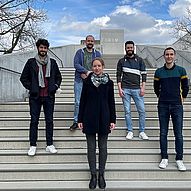
Abschlussarbeiten
Nachstehend finden Sie eine Liste der offenen Themen in unserer Gruppe. Wenn Sie an einem dieser Themen interessiert sind, wenden Sie sich bitte direkt an die angegebene Kontaktperson. Wir haben aktuell keine anderen offenen Themen. Wenn Sie jedoch eine interessante Idee für eine Master- oder Bachelorarbeit im Bereich QPC haben, können Sie dieses Thema gerne einem oder allen von uns vorschlagen.
Offene Themen
-
Title: Security Analysis of MAYO (Master thesis)
Description: MAYO is a recently published signature scheme based on multivariate quadratic equations. Its performance and key sizes are compatible to lattice-based signature schemes, including NIST's finalists Dilithium and Falcon. An appealing task for such a young scheme is to investigate it regarding possible improvements in cryptanalysis. Like Rainbow and LUOV, MAYO is a modification of UOV. The past has shown that such modifications can lead to additional attack vectors, that might be exploited. Thus, a detailed security analysis is an important step in the development process of MAYO.
Contact: Thomas Aulbach -
Title: Analyzing attacks against code-based signatures (Master thesis)
Description: Three signature schemes based on codes were submitted to the NIST PQC standardization process. During the first round, all of these submissions have been broken. The goal of this thesis is identify design mistakes made in the development of these signature schemes by analyzing the attacks and looking for similarities and differences.
Contact: Juliane Krämer (jointly supervised with Patrick Struck)
Laufende Arbeiten
-
Andreas Hellenbrand,
Master,
Performance Evaluation of CSIDH on the Surface,
joint with Prof. Dr. Reith
Abgeschlossene Arbeiten
-
Michael Schaller,
Master,
Codes from Fibered Surfaces,
joint with Prof. Dr. Bruinier -
Erik Kubaczka,
Master,
Analysis of Attacks on Multivariate PKE and KEM in the NIST Process -
Yulia Kuzovkova,
Master,
Side-Channel Analysis of Post-Quantum Secure Lattice-Based Cryptographic Schemes -
Yonca Bakanay,
Master,
Security proofs in the quantum random oracle model -
Georg Wurst,
Bachelor,
Number Theoretic Codes and their application in cryptography (in German),
joint with Prof. Dr. Bruinier -
Azar Parishan,
Bachelor,
On the Security Notions for Encryption Schemes -
Sebastian Schuberth,
Master,
Fault Attacks on Multivariate Signature Schemes



